英语基础必备140句子及句型
- 格式:doc
- 大小:85.00 KB
- 文档页数:8
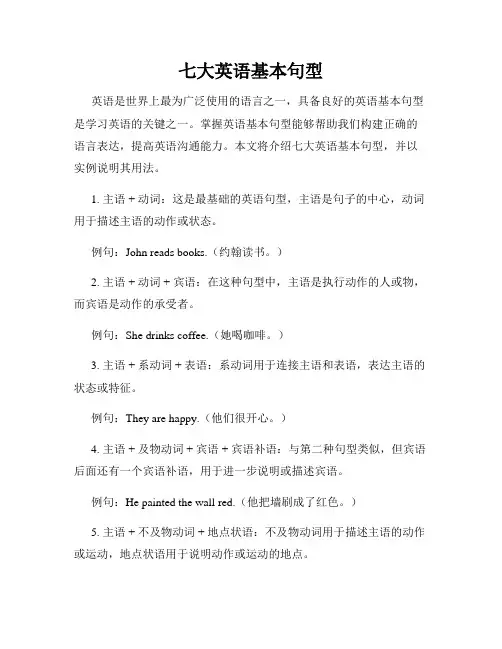
七大英语基本句型英语是世界上最为广泛使用的语言之一,具备良好的英语基本句型是学习英语的关键之一。
掌握英语基本句型能够帮助我们构建正确的语言表达,提高英语沟通能力。
本文将介绍七大英语基本句型,并以实例说明其用法。
1. 主语 + 动词:这是最基础的英语句型,主语是句子的中心,动词用于描述主语的动作或状态。
例句:John reads books.(约翰读书。
)2. 主语 + 动词 + 宾语:在这种句型中,主语是执行动作的人或物,而宾语是动作的承受者。
例句:She drinks coffee.(她喝咖啡。
)3. 主语 + 系动词 + 表语:系动词用于连接主语和表语,表达主语的状态或特征。
例句:They are happy.(他们很开心。
)4. 主语 + 及物动词 + 宾语 + 宾语补语:与第二种句型类似,但宾语后面还有一个宾语补语,用于进一步说明或描述宾语。
例句:He painted the wall red.(他把墙刷成了红色。
)5. 主语 + 不及物动词 + 地点状语:不及物动词用于描述主语的动作或运动,地点状语用于说明动作或运动的地点。
例句:He walks in the park.(他在公园散步。
)6. 主语 + 及物动词 + 间接宾语 + 直接宾语:某些动词需要同时使用间接宾语和直接宾语,间接宾语表示动作的接受者,而直接宾语则表示动作的承受者。
例句:She gave me a gift.(她给了我一份礼物。
)7. 存在句型:以there is/are开头的句子用于描述某处存在的人或物。
例句:There is a cat in the garden.(花园里有一只猫。
)以上是七大英语基本句型的简要介绍,这些句型是构建英语句子的基础。
通过熟练掌握并灵活运用这些句型,我们能够更准确、流利地表达自己的意思。
希望大家能够在学习英语的过程中,不断运用这些句型,提高自己的英语能力。
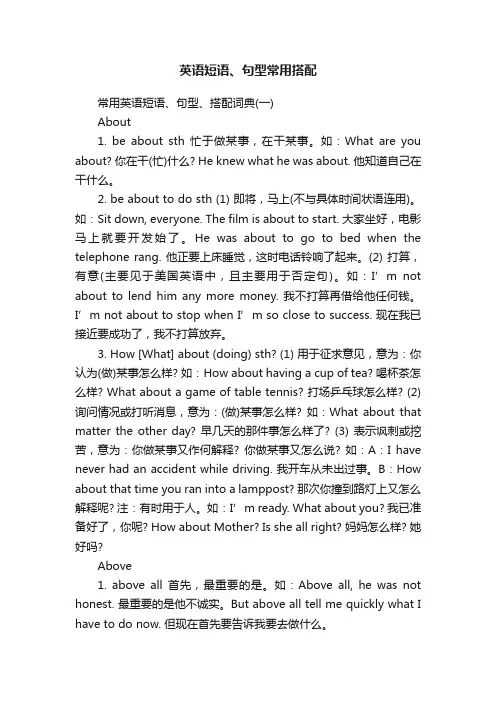
英语短语、句型常用搭配常用英语短语、句型、搭配词典(一)About1. be about sth 忙于做某事,在干某事。
如:What are you about? 你在干(忙)什么? He knew what he was about. 他知道自己在干什么。
2. be about to do sth (1) 即将,马上(不与具体时间状语连用)。
如:Sit down, everyone. The film is about to start. 大家坐好,电影马上就要开发始了。
He was about to go to bed when the telephone rang. 他正要上床睡觉,这时电话铃响了起来。
(2) 打算,有意(主要见于美国英语中,且主要用于否定句)。
如:I’m not about to lend him any more money. 我不打算再借给他任何钱。
I’m not about to stop when I’m so clo se to success. 现在我已接近要成功了,我不打算放弃。
3. How [What] about (doing) sth? (1) 用于征求意见,意为:你认为(做)某事怎么样? 如:How about having a cup of tea? 喝杯茶怎么样? What about a game of table tennis? 打场乒乓球怎么样? (2) 询问情况或打听消息,意为:(做)某事怎么样? 如:What about that matter the other day? 早几天的那件事怎么样了? (3) 表示讽刺或挖苦,意为:你做某事又作何解释? 你做某事又怎么说? 如:A:I have never had an accident while driving. 我开车从未出过事。
B:How about that time you ran into a lamppost? 那次你撞到路灯上又怎么解释呢? 注:有时用于人。
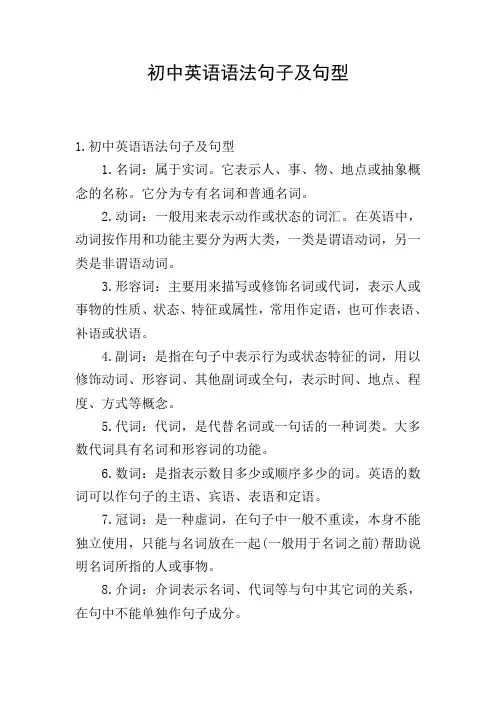
初中英语语法句子及句型1.初中英语语法句子及句型1.名词:属于实词。
它表示人、事、物、地点或抽象概念的名称。
它分为专有名词和普通名词。
2.动词:一般用来表示动作或状态的词汇。
在英语中,动词按作用和功能主要分为两大类,一类是谓语动词,另一类是非谓语动词。
3.形容词:主要用来描写或修饰名词或代词,表示人或事物的性质、状态、特征或属性,常用作定语,也可作表语、补语或状语。
4.副词:是指在句子中表示行为或状态特征的词,用以修饰动词、形容词、其他副词或全句,表示时间、地点、程度、方式等概念。
5.代词:代词,是代替名词或一句话的一种词类。
大多数代词具有名词和形容词的功能。
6.数词:是指表示数目多少或顺序多少的词。
英语的数词可以作句子的主语、宾语、表语和定语。
7.冠词:是一种虚词,在句子中一般不重读,本身不能独立使用,只能与名词放在一起(一般用于名词之前)帮助说明名词所指的人或事物。
8.介词:介词表示名词、代词等与句中其它词的关系,在句中不能单独作句子成分。
9.连词:连词是用来连接词与词、词组与词组或句子与句子、表示某种逻辑关系的虚词。
2.初中英语语法句子及句型系动词主要是be. 但还有一些动词在有些时候也可作系动词,有人称之为半系动词。
常见的半系动词有:(1)表示特征和存在状态的 be, seem, feel, appear, look, smell, taste, sound等;(2)表示状态延续的 remain, stay, keep, continue, stand等;(3)表示状态变化的 become, get, turn, go, run, fall, come, grow等。
系动词不能单独作谓语,要和表语一起作谓语He is a student. (S V P)Your idea sounds great. (S V P)3.初中英语语法句子及句型有些及物动词可以有两个宾语,如:give给,pass递,bring带,show显示。
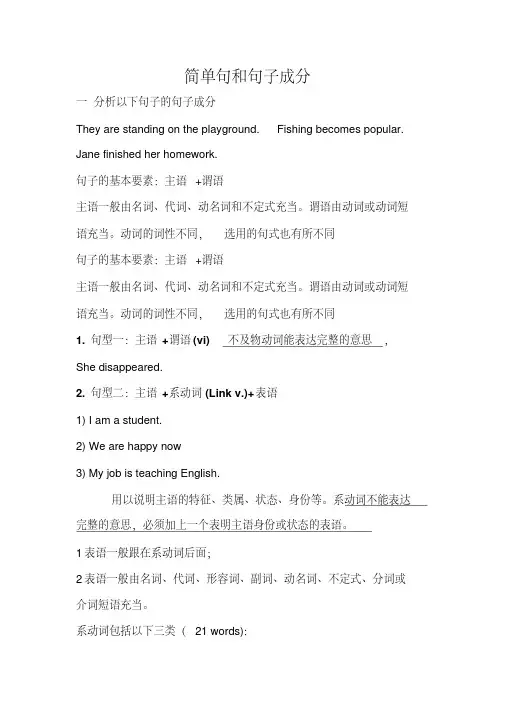
简单句和句子成分一分析以下句子的句子成分They are standing on the playground. Fishing becomes popular. Jane finished her homework.句子的基本要素:主语+谓语主语一般由名词、代词、动名词和不定式充当。
谓语由动词或动词短语充当。
动词的词性不同,选用的句式也有所不同句子的基本要素:主语+谓语主语一般由名词、代词、动名词和不定式充当。
谓语由动词或动词短语充当。
动词的词性不同,选用的句式也有所不同1. 句型一:主语+谓语(vi) 不及物动词能表达完整的意思,She disappeared.2. 句型二:主语+系动词(Link v.)+表语1) I am a student.2) We are happy now3) My job is teaching English.用以说明主语的特征、类属、状态、身份等。
系动词不能表达完整的意思,必须加上一个表明主语身份或状态的表语。
1表语一般跟在系动词后面;2表语一般由名词、代词、形容词、副词、动名词、不定式、分词或介词短语充当。
系动词包括以下三类(21 words):be动词“是”; s eem 似乎,好像, appear 显得, 好像,似乎; feel 觉得感觉; look看起来;smell闻起来; taste尝起来;sound听起来;become 变得;get 变得; turn 变成; grow 逐渐变成;go 变得;fall 进入某种状态come 变成;stay保持;keep 保持; remain仍然是stand 处于某种状态;continue 继续存在3. 句型三:主语+谓语(vt. )+宾语名词或代词(n./pron)Many boys like football very much.二分析以下句子的句子成分He gave his sister a book.They made me happy.I will write you a letter.The doctor advised me to give up smoking.4. 句型4:主语+谓语(vt)+间接宾语(人)+直接宾语(物)He brings me cookies every day. →He brings cookies to me every day. She bought me a beautiful skirt. →She bought a beautiful skirt for me.特点:谓语动词必须跟有两个宾语才能表达完整的意思。
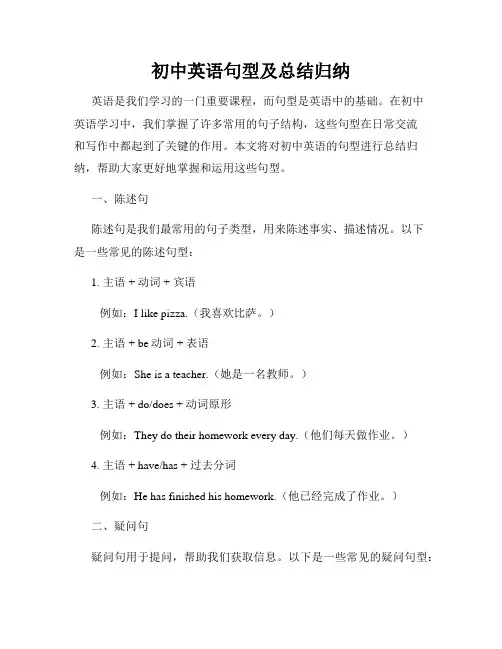
初中英语句型及总结归纳英语是我们学习的一门重要课程,而句型是英语中的基础。
在初中英语学习中,我们掌握了许多常用的句子结构,这些句型在日常交流和写作中都起到了关键的作用。
本文将对初中英语的句型进行总结归纳,帮助大家更好地掌握和运用这些句型。
一、陈述句陈述句是我们最常用的句子类型,用来陈述事实、描述情况。
以下是一些常见的陈述句型:1. 主语 + 动词 + 宾语例如:I like pizza.(我喜欢比萨。
)2. 主语 + be动词 + 表语例如:She is a teacher.(她是一名教师。
)3. 主语 + do/does + 动词原形例如:They do their homework every day.(他们每天做作业。
)4. 主语 + have/has + 过去分词例如:He has finished his homework.(他已经完成了作业。
)二、疑问句疑问句用于提问,帮助我们获取信息。
以下是一些常见的疑问句型:1. 疑问词 + 助动词 + 主语 + 动词?例如:What do you like?(你喜欢什么?)2. 助动词 + 主语 + 动词?例如:Do you play basketball?(你打篮球吗?)3. 特殊疑问句例如:Where did you go yesterday?(你昨天去哪里了?)三、祈使句祈使句用于表达请求、命令或建议。
以下是一些常见的祈使句型:1. 动词原形 + 其他成分例如:Open the window, please.(请打开窗户。
)2. 动词原形 + 不定代词/名词例如:Eat some fruit.(吃些水果。
)四、感叹句感叹句用于表达惊讶、赞美、喜悦等情感。
以下是一些常见的感叹句型:1. How + 形容词/副词 + 主语 + 动词!例如:How beautiful the flowers are!(花儿多美啊!)2. What + 形容词 + 名词 + 主语 + be动词!例如:What a lovely dog he has!(他有一只多可爱的狗啊!)五、条件句条件句用于表达假设、条件和结果之间的关系。
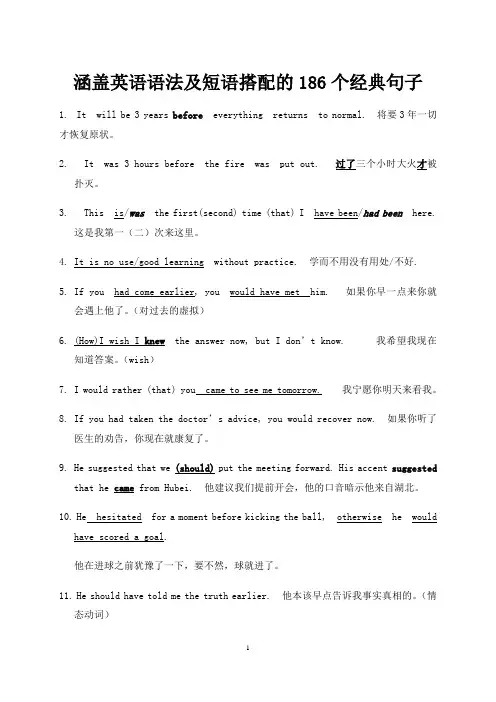
涵盖英语语法及短语搭配的186个经典句子1.It will be 3 years before everything returns to normal. 将要3年一切才恢复原状。
2.It was 3 hours before the fire was put out. 过了三个小时大火才被扑灭。
3.This is/was the first(second) time (that) I have been/had been here.这是我第一(二)次来这里。
4.It is no use/good learning without practice. 学而不用没有用处/不好.5.If you had come earlier, you would have met him. 如果你早一点来你就会遇上他了。
(对过去的虚拟)6.(How)I wish I knew the answer now, but I don’t know.我希望我现在知道答案。
(wish)7.I would rather (that) you came to see me tomorrow. 我宁愿你明天来看我。
8.If y ou had taken the doctor’s advice, you would recover now.如果你听了医生的劝告,你现在就康复了。
9.He suggested that we (should)put the meeting forward. His accent suggestedthat he came from Hubei. 他建议我们提前开会,他的口音暗示他来自湖北。
10.He hesitated for a moment before kicking the ball, otherwise he wouldhave scored a goal.他在进球之前犹豫了一下,要不然,球就进了。
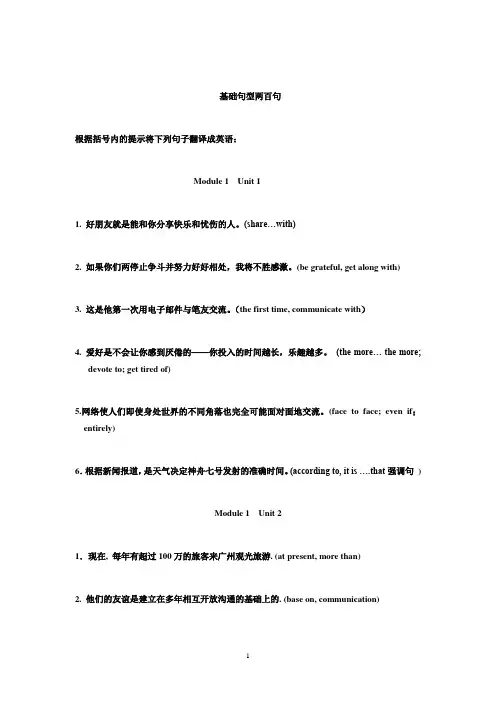
基础句型两百句根据括号内的提示将下列句子翻译成英语:Module 1 Unit 11. 好朋友就是能和你分享快乐和忧伤的人。
(share…with)2. 如果你们两停止争斗并努力好好相处,我将不胜感激。
(be grateful, get along with)3. 这是他第一次用电子邮件与笔友交流。
(the first time, communicate with)4. 爱好是不会让你感到厌倦的——你投入的时间越长,乐趣越多。
(the more… the more;devote to; get tired of)5.网络使人们即使身处世界的不同角落也完全可能面对面地交流。
(face to face; even if;entirely)6.根据新闻报道,是天气决定神舟七号发射的准确时间。
(according to, it is ….that强调句)Module 1 Unit 21.现在, 每年有超过100万的旅客来广州观光旅游. (at present, more than)2. 他们的友谊是建立在多年相互开放沟通的基础上的. (base on, communication)3. 世界淡水资源十分有限,因此我们必须充分利用。
(make use of, resources)4. 我将十分乐意参加任何能丰富我对世界认识的讨论。
(take part in, enrich)5. 不管你相不相信, 我们已经逐渐地可以用英语流利地表达自己了. (believe it or not,gradually, express, fluently)6. 实际上学好英语有很多简单的方法, 例如看英文电视或和外国朋友在线聊天。
(actually,a number of, such as)7. 即使这工作要花掉我六个星期的时间,我仍决心要完成这份工作。
(even if, determined )8. 政府应该尽快想出更好的办法来解决高油价所带来的问题. (come up with, petrol)9. 全体同学都要准时参加明天举行的会议. (request)Module 1 Unit 31. 杰克给了我一个坚定的眼神,这眼神表明他不会改变主意,也不会屈服。
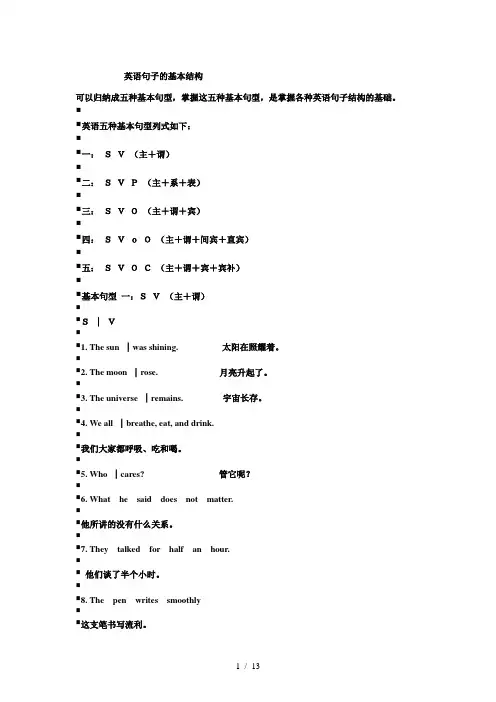
英语句子的基本结构可以归纳成五种基本句型,掌握这五种基本句型,是掌握各种英语句子结构的基础。
▪▪英语五种基本句型列式如下:▪▪一:SV(主+谓)▪▪二:SVP(主+系+表)▪▪三:SVO(主+谓+宾)▪▪四:SVoO(主+谓+间宾+直宾)▪▪五:SVOC(主+谓+宾+宾补)▪▪基本句型一:SV(主+谓)▪▪S│V▪▪1. The sun │was shining. 太阳在照耀着。
▪▪2. The moon │rose. 月亮升起了。
▪▪3. The universe │remains. 宇宙长存。
▪▪4. We all │breathe, eat, and drink.▪▪我们大家都呼吸、吃和喝。
▪▪5. Who │cares? 管它呢?▪▪6. What he said does not matter.▪▪他所讲的没有什么关系。
▪▪7. They talked for half an hour.▪▪他们谈了半个小时。
▪▪8. The pen writes smoothly▪▪这支笔书写流利。
▪基本句型二:SVP(主+系+表)▪▪S│V(是系动词)│P▪▪1. This │is │an English-Chinese dictionary.▪▪这是本英汉辞典。
▪▪2. The dinner │smells │good.▪▪午餐的气味很好。
▪▪3. He │fell │in love.▪▪他堕入了情网。
▪▪4. Everything │looks │different.▪▪一切看来都不同了。
▪▪5. He is growing tall and strong.▪▪他长得又高又壮▪▪6. The trouble is that they are short of money. 麻烦的是他们缺少钱。
▪▪基本句型三:SVO(主+谓+宾)▪▪S│V(及物动词)│O▪▪1. Who │knows │the answer? 谁知道答案?▪▪2. She │smiled │her thanks. 她微笑表示感谢。
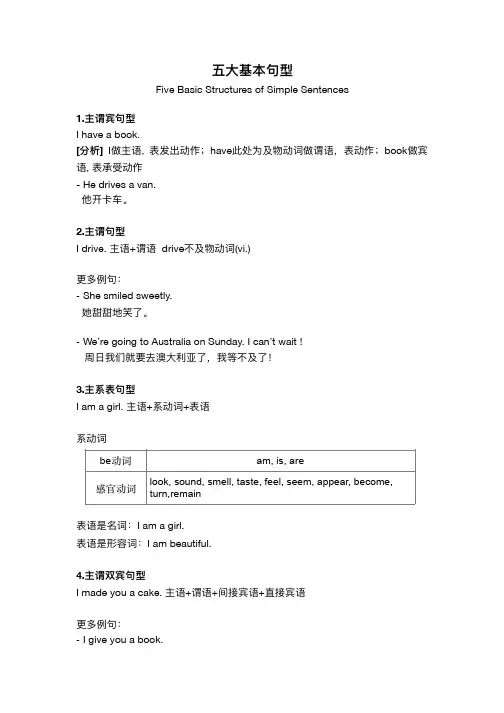
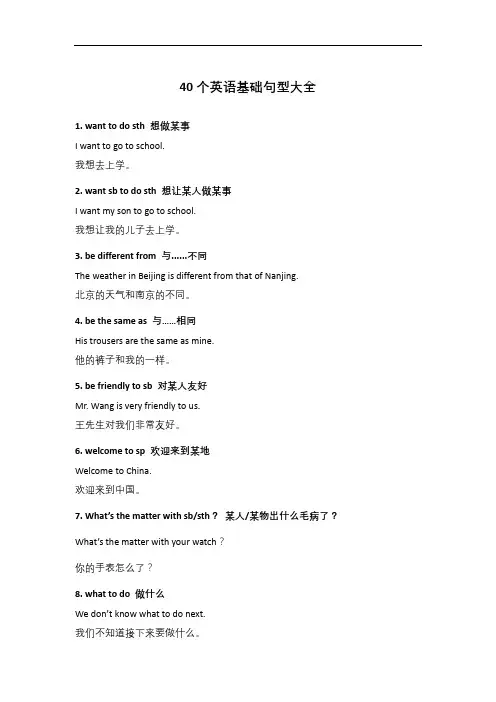
40个英语基础句型大全1. want to do sth 想做某事I want to go to school.我想去上学。
2. want sb to do sth 想让某人做某事I want my son to go to school.我想让我的儿子去上学。
3. be different from 与......不同The weather in Beijing is different from that of Nanjing.北京的天气和南京的不同。
4. be the same as 与……相同His trousers are the same as mine.他的裤子和我的一样。
5. be friendly to sb 对某人友好Mr. Wang is very friendly to us.王先生对我们非常友好。
6. welcome to sp 欢迎来到某地Welcome to China.欢迎来到中国。
7. What’s the matter with sb/sth?某人/某物出什么毛病了?What’s the matter with your watch?你的手表怎么了?8. what to do 做什么We don’t know what to do next.我们不知道接下来要做什么。
9. let sb do sth 让某人做某事Let him enter the room.让他进入房间。
10. let sb not do sth 让某人不做某事Let him not stand in the rain.让他不要站在雨中。
11. why don’t you do sth?你怎么不做某事呢?Why don’t you play football with us?你怎么不和我们踢足球呢?12. why not do sth?怎么不做某事呢?Why not play football with us?为什么不和我们踢足球呢?13. make sb sth 为某人制造某物My father made me a kite.我爸爸给我做了一个风筝。
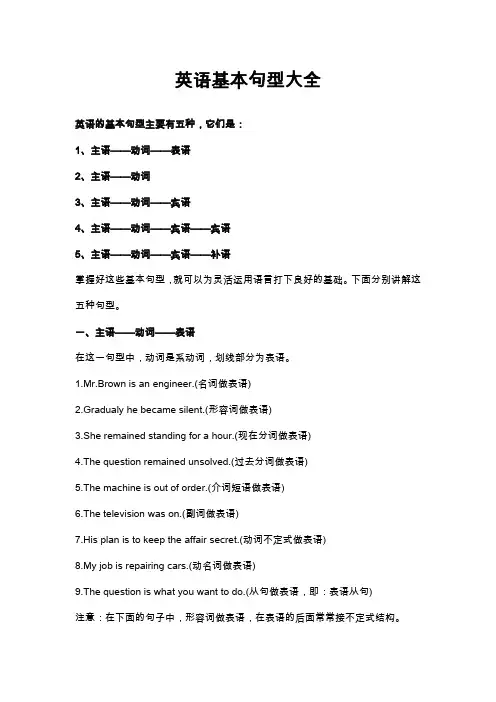
英语基本句型大全英语的基本句型主要有五种,它们是:1、主语——动词——表语2、主语——动词3、主语——动词——宾语4、主语——动词——宾语——宾语5、主语——动词——宾语——补语掌握好这些基本句型,就可以为灵活运用语言打下良好的基础。
下面分别讲解这五种句型。
一、主语——动词——表语在这一句型中,动词是系动词,划线部分为表语。
1.Mr.Brown is an engineer.(名词做表语)2.Gradualy he became silent.(形容词做表语)3.She remained standing for a hour.(现在分词做表语)4.The question remained unsolved.(过去分词做表语)5.The machine is out of order.(介词短语做表语)6.The television was on.(副词做表语)7.His plan is to keep the affair secret.(动词不定式做表语)8.My job is repairing cars.(动名词做表语)9.The question is what you want to do.(从句做表语,即:表语从句)注意:在下面的句子中,形容词做表语,在表语的后面常常接不定式结构。
I'm happy to meet you.They are willing to help.We are determined to follow his example.二、主语——动词在这一句型中,动词为不及物动词及不及物的动词词组。
在有的句子中,不及物动词可以有状语修饰。
1.The sun is rising.2.I'll try.3.Did you sleep well?(well做状语,修饰不及物动词sleep)4.The engine broke down.注意:在此句型中,有少数不及物动词表达被动含义,表达主语本身所具有的特性,不用被动语态。
基本句型一.主—谓—宾—状句型1、主————谓I study . (肯定式)I don’t study. (否定式)Do you study ? (疑问式)Yes, I do. No, I don’t. (简答式)2、主————谓————状I study hard. (肯定式)I don’t study hard. (否定式)Do you study hard ? (疑问式)Yes, I do. No, I don’t. (简答式)3、主————谓————宾I study English. (肯定式)I don’t study English. (否定式)Do you study English? (疑问式)Yes, I do. No, I don’t. (简答式)4、主———谓———间宾———直宾He told me a story. (肯定式)He didn’t tell me a story. (否定式)Did he tell me a story? (疑问式)Yes, he did . No, he didn’t .(简答式)5、主———谓———宾———宾补They call me Tom. (肯定式) They don’t call me Tom. (否定式)Do they call me Tom? (疑问式)Yes, they do . No, they don’t . (简答式)总结:主—谓—宾—状句型的五个类型的肯定式,否定式,一般疑问式及其肯定和否定的简略回答完全一样,规律性很强。
句子成分概述英语在其长期发展过程中形成了一种相对固定的句子结构:“主语+谓语”,这与汉语是相似的。
“主语”是句子的话题,是信息传递的出发点;“谓语”是对话题所作的说明,是说话人说要传递的信息。
试观察下列句子:主语谓语I am a Chinese boy.Mary has two best friendsSeeing is believing .To do is harder than to say.We wish you success!从上述例子可以看出,作为句子的话题,主语通常是一些事物性或实体性的词,否则,主语便不能成为句子的话题,不能成为信息传递的出发点。
一、英语基本句型句式1:主谓结构(主语+不及物动词)★此句型常用不及物动词或相当于不及物动词的动词短语做谓语。
如:He laughed. 他笑了。
Spring is coming. 春天快来了。
★注意:该句型的谓语由于是不及物动词,所以是没有被动语态的。
如,事故发生在那个街角。
应该是:The accident happened at that street corner.不可以:The accident was happened at that street corner.过去30年中国发生了巨大的变化。
可以说:Great changes have taken place in the past 30 years in China.不可以:Great changes have been taken place in the past 30 years in China.★翻译下列句子:1. 经理还没来。
_____________________________________________.2. 汽车突然停下了。
________________________________________________3. 20**年战争爆发了。
__________________________________________________.4. 你应该努力学习。
_____________________________________________________5. 她昨天回家很晚。
______________________________________________________.6. 那天早上我们谈了很多。
___________________________________________________7. 会议将持续两个小时。
_____________________________________________________8. 在过去的十年里,我的家乡已经发生了巨大的变化。
基础句型两百句根据括号内的提示将下列句子翻译成英语:Module 1 Unit 11. 好朋友就是能和你分享快乐和忧伤的人。
(share…with)2. 如果你们两停止争斗并努力好好相处,我将不胜感激。
(be grateful, get along with)3. 这是他第一次用电子邮件与笔友交流。
(the first time, communicate with)4. 爱好是不会让你感到厌倦的——你投入的时间越长,乐趣越多。
(the more… the more;devote to; get tired of)5.网络使人们即使身处世界的不同角落也完全可能面对面地交流。
(face to face; even if;entirely)6.根据新闻报道,是天气决定神舟七号发射的准确时间。
(according to, it is ….that 强调句 )Module 1 Unit 21.现在, 每年有超过100万的旅客来广州观光旅游. (at present, more than)2. 他们的友谊是建立在多年相互开放沟通的基础上的. (base on, communication)3. 世界淡水资源十分有限,因此我们必须充分利用。
(make use of, resources)4. 我将十分乐意参加任何能丰富我对世界认识的讨论。
(take part in, enrich)5. 不管你相不相信, 我们已经逐渐地可以用英语流利地表达自己了. (believe it or not,gradually, express, fluently)6. 实际上学好英语有很多简单的方法, 例如看英文电视或和外国朋友在线聊天。
(actually, a number of, such as)7. 即使这工作要花掉我六个星期的时间,我仍决心要完成这份工作。
(even if, determined )8. 政府应该尽快想出更好的办法来解决高油价所带来的问题. (come up with, petrol)9. 全体同学都要准时参加明天举行的会议. (request)Module 1 Unit 31. 杰克给了我一个坚定的眼神,这眼神表明他不会改变主意,也不会屈服。
初中英语50个必考句型8大时态结构,你掌握了吗?今天为大家整理的是初中英语基础的50个句型和8大时态,在中考及各种大小考中的出现频次也是很多,大家赶快看看自己有没有掌握吧!一.必背句型句型1:There+be +主语+地点状语/ 时间状语There're three books on the table.桌子上有三本书。
句型2:What's wrong with+sb./sth.?What's wrong with your telephone?你的手机有什么毛病?句型3:How do you like…?How do you like China?你觉得中国怎么样?句型4:What do you like about…?What do you like about China?你喜欢中国的什么?句型5:had better(not)+动词原形You'd better ask that policeman over there.你最好去问问那边的那个警察。
句型7:Thank+sb.+for (doing) sth.Thank you for coming to see me.感谢你来看我。
句型8:So+be/情态动词/助动词+主语He is a student. So am I.他是一个学生,我也是。
句型9:not…until…He didn't have supper until his parents came back.直到他的父母回来他才吃饭。
句型10:比较级and+比较级The baby cried harder and harder.那孩子哭得越来越厉害。
句型11:the+比较级,the+比较级The more one has,the more one wants.拥有的越多,想要的越多。
句型12:…as+adj./adv.+as……not as(so)+adj./adv.+as…Last Sunday the weather was not so wet as it is today.上个星期天的天气不如今天的天气潮湿。
简单句专项练习1这所房子花了我一大笔钱。
(cost)The house cost me a great deal of money.2昨天的大雨使得我们没能踢球。
(prevent…from)Yesterday’s heavy rain prevented them from plying football.3日本位于中国的东部。
(lie)Japan lies to the east of China.4在业余时间里,他专心致志的学习。
(devote)He devoted himself to studying in his spare time.5那个温和的老人拍了拍女孩的脑袋。
(pat)The old gentleman patted the girl on the head.6这本书值得一看。
(worth)The book is worth reading.7你每天花多少时间上网。
(spend)how much time do you spend on-line every day?8我今晚给你打电话。
(ring)I’ll ring you up tonight.9这部电影值得一看。
(worth)This film is worth seeing.10你最近收到过母亲的来信吗。
(hear from)Have you heard from your mother recently?复合句专项练习1这是他看过的最有意义的一部电影。
This is one of the most interesting movies I have ever seen.2带着一副眼镜的那个女孩是安。
The girl who is wearing a pair of glasses is Ann.3我对你所说的很感兴趣I’m very interested in what you said.4劳驾,请问我开车如何到电视台?Excuse me, how can I get to the TV station if I drive a car?5问题是我们如何得到未污染的水。
The problem is how we can get water without being polluted.6不论你去哪里我都跟着你。
Wherever you go, I’ll follow you.7他到电影院时,电影已经开始十多分钟了。
The film had been on for over ten minutes when they got to the cinema. 8如果你缺钱,你可以乘公共汽车。
(be short of)If you’re short of money, you will probably go by bus.9从那时起我就想了解他从事什么工作。
(wonder)I have wondered what he has been working on since then.10如果你听从我的劝告而努力学习,你考试就会及格。
If you take/follow my advice and study hard, you will pass the exam.句型专项练习1你们家乡气候怎样?What’s the climate like in your hometown?2上星期我们就是在这所学校开的会。
(It is +强调句+ that…)It is in this school that we had a meeting last week.3到吃午饭的时间了。
It’s time for lunch.4她每天直到做完作业后才看电视。
(not… until…)He doesn’t watch TV until he has finished his homework every day.5和他谈这事无用。
It is no use talking about it with him.6我们刚一到,音乐会就开始了。
(No sooner…than…)No sooner had we arrived than the concert began.7对我们个人来说,关爱自身的健康非常重要It’s important for us to be responsible for taking care of our own health. 8她太兴奋了,那天晚上都没睡觉。
(so… that…)She was so excited that she didn’t sleep that night.9他去澳大利亚已经五年了。
It is five years since he left for Australia.10她去美国已经三年了。
(It is … since…)It is three years since she left for the United States.被动语态专项练习1中华人民共和国成立于1949年。
The People’s Republic of China was founded in 1949.2 2012年奥林匹克运动会将在伦敦举行。
(hold)The 2012 Olympic Games will be held in London.3全世界都踢足球。
Football is played all over the world.4这种纸是用木头做的。
(be made from)This kind of paper is made from wood.5访问上海推迟了。
(put off)The visit to Shanghai has been put off.6这部小说已被译成英语。
The novel has been translated into English.7前面的老路正在修。
The old roads ahead are being repaired now.8古老的伦敦桥被推倒,并在美国重建。
(pull down)The old London bridge was pulled down, and rebuilt in the United States.9下月要建一家新的妇幼医院。
A new hospital for women and children will be built next month.10你星期天也被要求工作。
(be expected to do)You will be expected to work on Sundays.综合练习1昨天他们用了大约三个半小时完成了那项工作。
Yesterday it took them about three hours and a half to finish the work.2孩子们学好英语和计算机也是很重要的。
It’s also important for children to learn English and computer well.3上学期他学习不努力,结果数学考试不及格。
(fail)He didn’t work hard last term, as a result, he failed in his maths exam.4学生们对报告所讲的内容很感兴趣。
The students were very interested in what the reporter said.5当他们到达电影院时,电影已经开始十五分钟了。
When they got to the cinema, the film had already been on for fifteen minutes.6今晚我将给你打电话。
(call up)I’ll call you up this evening.7他们在北京生活了很多年,对北京的气候已经习惯了。
(be used to)They have lived in Beijng for many years, and they have been used to the weather here. 8他们成功地执行了他们的计划。
(carry out)They carried out their plan successfully.9老师告诉我们这本小说值得一读。
(worth)The teacher told us that this novel was worth reading.10一天一只狐狸想和公鸡交朋友。
(make friends)One day a fox wanted to make friends with a cock.11他告诉我他去过上海三次。
He told me that he had been to Shanghai three times.12我在下一站下车。
(get off)I’m getting off the train at the next station.13我不知道她是否胜任这份工作。
(fit for)I don’t know whether she is fit for the job.14这种气体发出一种不好闻的气味。
(give off)the gas gave off an unpleasant smell.15昨天在回家的路上,我遇到了父亲的一位老朋友。
On my way home yesterday, I met an old friend of my father’s.16我到电影院时灯光已经灭了。
(go out)The lights had already gone out when I got to the cinema.17这正是他们要找的磁带。
This is the tape that they are looking for.18你今天必须去看牙吗?(have got to)Have you got to go to the dentist’s today?19前天她因病没去上班。
(because of)She didn’t go to work because of her illness the day before yesterday.20鲍勃想抓住约翰的胳膊。
(catch/take/get hold of)Bob tried to catch (get/take) hold of John’s arm.21事实上,多数交通事故是可以避免的。
AvoidIn fact, most traffic accidents can be avoided.22詹妮累了,但还是继续工作。